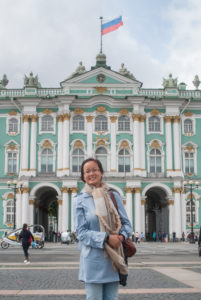On Language, Ease, and Diversity
I’ve just returned from my summer study abroad experience in Saint Petersburg, Russia. For eight weeks, I was immersed in an entirely different culture where English was not the dominant language. There were a lot of things I had to get used to from using Celsius instead of Fahrenheit, to having to pay for water in restaurants, to walking everywhere. While these changes were not preferable, there were also a lot of things that I really enjoyed, including the abundance of flower shops, the many cats wandering around, and pelmeni (Russian dumplings).

Despite the initial adjustment needed to get used to my surroundings, I was quickly able to adapt to my new life. My prior knowledge of Russian and my prior experience with having being abroad before undoubtedly helped with this, but another reason I was not as disoriented as I could have been were the ever-present traces, however slight, of English. Although I tried to limit my exposure to English as much as possible, it was impossible to escape it entirely. I heard it on the bus. I saw it on restaurant menus. I spotted it on metro trains.
This made me stop and think about how speaking English as a first language, or even having near-native fluency in it, grants a person more accessibility to opportunities such as travel. My Russian host mom told me a story of a time when she went to Spain on vacation and got lost in the metro system because she couldn’t speak Spanish… or English. Although sites like Google Translate have made scenarios like that much rarer, it is still challenging to navigate an area if you don’t speak the local language.
At first, the convenience of seeing English near-everywhere may seem like a blessing to native speakers. After all, they are able to traverse the globe and find a fellow English speaker in most places they visit. They do not necessarily have to take the time to learn key words in the local language although many do choose to do so. However, I think that this ease is also somewhat of a burden. Those who decide not to invest much time in learning a local language miss out on a lot.

One of the best ways to understand a different culture is through language. Language is able to manifest subtleties that may not be noticed on the surface. I think these insights into culture are extremely fascinating, and I think they are something that far too many people—English speakers and non-English speakers alike—miss out on. Learning a language can be so eye-opening, and it’s something I think everyone should try at some point in their lives. But, at the very least, I think people should be more aware of the value of language and linguistic diversity. Although it is extremely useful to know global languages such as English, it is also important to embrace other languages and the differences between them.
Living abroad for two months was a life changing experience in many ways. But, perhaps what was most rewarding about it was getting to experience firsthand just how much language shapes society, and consequently, oneself. I’ve been back in the United States for about a week now, and I still feel the urge to say “спасибо” instead of “thank you.” Now, when I speak to my mom in Spanish, I am tempted to say “да” instead of “yes.” Even though I’ve always been terrible at memorizing vocabulary, I learned several new words in Saint Petersburg with little effort. Being immersed in Russian culture and speaking the language every day markedly improved my Russian skills, but more importantly, reminded me of the importance of understanding and appreciating other cultures.

